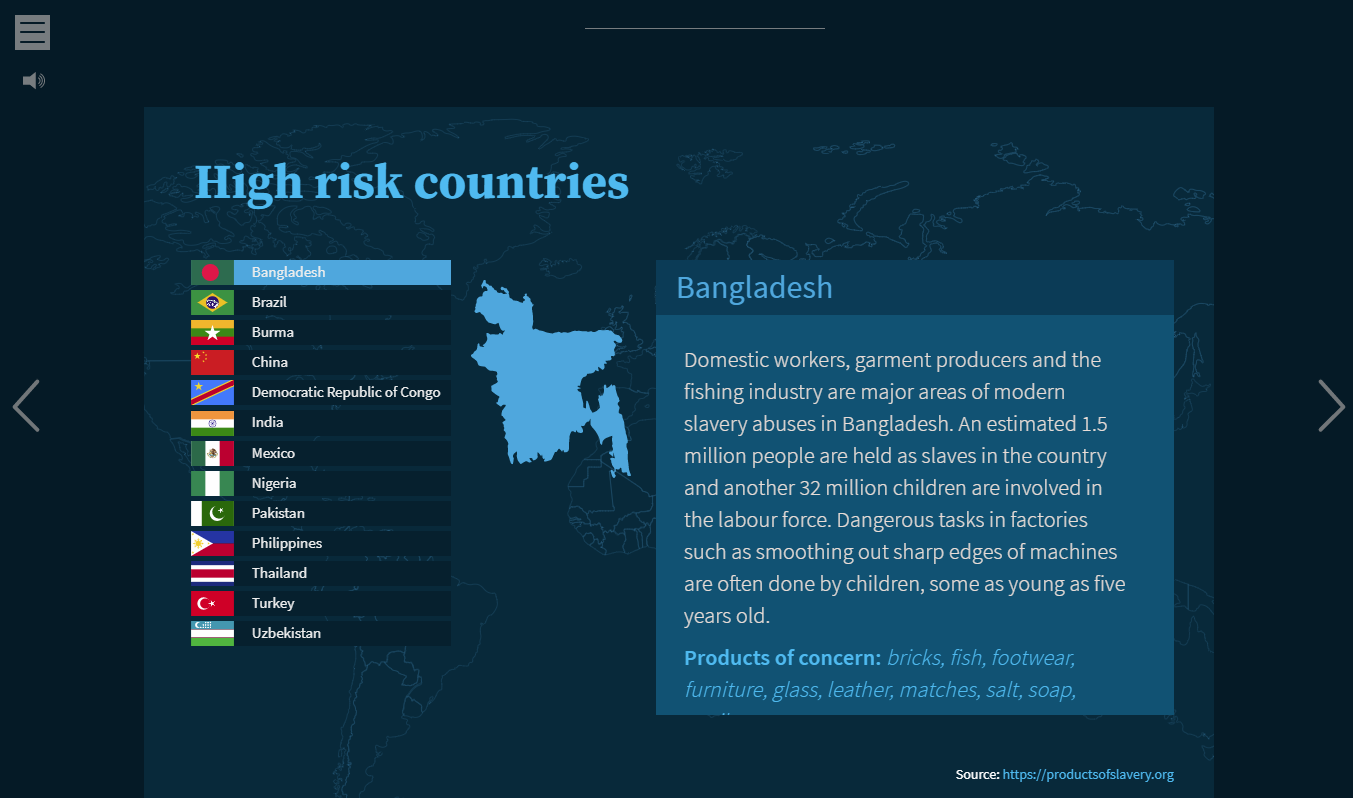Everyone, everywhere, has the has the right to live a life free of slavery. We’d like to think slavery has been consigned to history, but unfortunately, that’s far from true. While it may look different than the traditional slavery-associated images of shackles and transatlantic ships, and while it may be kept just out of site, it is actually taking place everywhere, in every single country around the world.
When people are severely exploited by others for personal or commercial gain, this is modern slavery. This exploitation can take many forms, from human trafficking, to forced labour and bonded labour, descent-based slavery, forced child labour, and forced and early marriage. Some of these, such as descent-based slavery, are more prevalent in places such as Africa, but many others are prevalent everywhere, including all throughout Western society.
Though millions of men, women and children are being held in slavery and deprived of their basic human freedom, and there is much work to be done, there are slivers of progress being made to tackle modern-day slavery. What are governments around the world doing to help tackle this dreadful phenomenon?
United Kingdom
In September 2020 the UK government published a response to the Home Office’s Transparency in Supply Chains consultation aiming to strengthen reporting under the Modern Slavery Act.
Currently there are six areas for mandatory reporting including policies, organisational structure, due diligence, risk assessment, the actions the organisation has taken and staff training. The government is considering amending some of these areas and potentially making reporting on these specific areas mandatory.
This will mean organisations will have to state what steps they are not taking in a particular area and why.
The government is planning to require organisations to publish their modern slavery statements on a state-run reporting service and require a single reporting deadline of 30 September. Public bodies with a turnover of more than £36 million will have to report as well.
The best thing for businesses to do is review the contents of their modern slavery statements in light of the proposed changes, particularly the 6 reporting areas which are set to become mandatory and also the potential additional reporting areas.
In January 2021 the Foreign Secretary Dominic Raab said the government will introduce fines for businesses who do not comply with the reporting obligations which is stronger than the current regime which does not have fines.
Canada
The Candian Senate is due to review Bill S-216 which would introduce a Modern Slavery Act which would require mandatory modern slavery disclosure by companies covered by the Act. This has been introduced several times into the Canadian Parliament but has so far failed to make it into law.
If it becomes law, the legislation will apply to every business in Canada with at least $20 million in assets, $40 million in revenue or with an average of 250 employees that also operates in Canada.
Businesses will need to prepare an annual modern slavery report and outline the steps they are taking to reduce the risk of forced labour or child labour in their supply chains. Similar to the UK law, policies, activities, mitigation measures and training will need to be reported on. The Bill includes provisions for fines of up to $250,000 for non compliance as well as personal liability for company directors.
The EU
The EU is preparing to introduce mandatory human rights due diligence disclosures in 2021. Under proposals from the European Commissioner for Justice announced in April 2020, the legislation would require businesses to carry out due diligence assessments in relation to the potential human rights and environmental impacts of their operations and supply chains, and will likely have sanctions for non-compliance.
The EU rules are likely to be broader than other modern slavery reporting requirements as through this regime the EU is expecting companies to undertake human rights and envoronemtnal due diligence as part of the standard of care they owe, as opposed to a procedural requirement.
Only around a third of EU companies are currently undertaking human rights due diligence measures.
In June 2020, the European Parliament set out what it expects the measures to do. They want to see due diligence covering:
- All human rights
- All violations of such rights
- Specifically refer to the most vulnerable groups including women, children, migrants and indigenous peoples
- Include all companies either based in the EU or who offer goods or services in the EU
- Include all levels of the supply chain
- Require businesses to analyse, mitigate and remedy their impact
In October 2020 the European Commission launched a public consultation on the topic of sustainable corporate governance.
The European Parliament has also begun talking about including companies in a value chain as opposed to a supply chain.
Article 3 of the EP Draft Directive defines a ‘value chain’ as encompassing all “entities with which the undertaking has a direct or indirect business relationship, upstream and downstream, and which either (a) supply products or services that contribute to the undertaking’s own products or services, or (b) receive products or services from the undertaking”. The term ‘value chain’ therefore covers a much broader group of business entities than ‘supply chain’.
What can you do?

The COVID-19 pandemic has only increased the risk of modern slavery, and now more than ever it is important for businesses to do their bit in the fight against modern slavery. Businesses can mitigate the risks of getting ensnared in modern slavery by carrying out vigorous supplier audits, enrolling staff in slavery training, and publishing a slavery and human trafficking statement.








